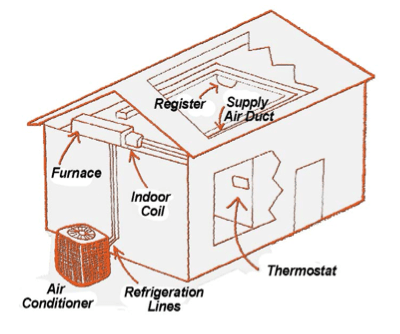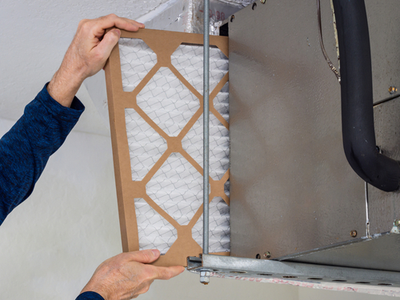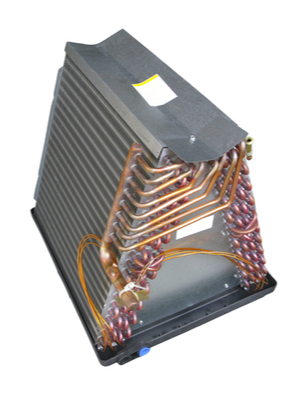May 23, 2024
10 Common Air Conditioning Problems (and Solutions) in Spring [Video]

When temperatures start to warm up, the last thing you need is an unexpected air conditioning problem. The good news is most common air conditioner problems are preventable!
Below are the most common AC issues we see along with ways you can avoid them. If this spring air conditioner maintenance checklist feels too challenging, consider an AC tune up from a friendly Applewood HVAC technician. We’d be happy to cover all the points on this list and make sure your AC system is ready to cool your home all summer.
1. When Should I Turn My Air Conditioner On?
See our video above for the complete answer. With Colorado weather being all over the map, it’s hard to know when you should start using your AC. Typically, once the low daily temperature reaches 70, you’ll want to turn your system on. Watch the forecasts and start your AC to make sure it works. Don’t wait until it’s too hot to discover you need a maintenance call.
2. Air Conditioner Keeps Tripping Breaker
One of the most common causes of no-cool calls is a tripped breaker.
Breakers are designed to protect your system and your home. If your AC system isn’t turning on, check that the circuit it runs on isn’t tripped. If it is, simply flip the breaker switch all the way off and then all the way on. If the problem continues, it may be a sign of a larger electrical issue.
Sometimes the fix is simple, like a bad breaker, loose wire or a bad capacitor. Our experienced technicians can check your system and make any electrical upgrades so your AC has enough power to keep running all summer, without tripping your electrical system.
3. Dirty Furnace Filter
Every year, we get service calls and discover that the A/C isn’t cooling because of restricted air flow from a dirty filter.
When your AC cools your home, it uses the same system as your furnace. This means that your furnace filter is the same as your air conditioner filter. Whether heating or cooling, you should replace your filter at least every other month to keep the air clean and flowing freely through.
Dirty filters reduce indoor air quality, make homes less comfortable and can result in frozen indoor coils. They can lead to serious, and sometimes expensive repairs. Set a reminder and keep your system running with a regular filter swap.

4. Air Conditioner Refrigerant Leak
An air conditioning system is a sealed system. It should never leak refrigerant. When it does, several things could happen:
- Efficiency falls.
- Electricity use rises.
- Your air conditioner may not cool.
- AC coils freeze.
- The compressor could become damaged.
Refrigerants are greenhouse gasses. If you have an air conditioner leaking refrigerant, schedule with one of our technicians. We use a variety of tools to track down and repair leaks. Often, the problem is as simple as a bad valve or a weakened connection between a fitting and tubing–which we can quickly repair.
5. Switch Turned Off or Thermostat Problems
Some heating and A/C systems have a wall-type switch on the indoor unit for safety and convenience. It can easily be confused with a light switch. If this gets accidentally switched off or left off during mild weather, your air conditioner will not start. Always check your air conditioner switch before calling for service.
Additionally, some thermostats need to be toggled between heating and cooling modes. If your thermostat is in the wrong position or is broken, your A/C unit won’t start. If your thermostat is set to “cool” but your AC is not turning on, it could be a faulty thermostat or an issue with the signal between them.
Consider investing in a quality digital thermostat that will save energy and last longer. We advise against some of the cheaper models available from the big box stores which might break or cause a voltage spike and malfunction.
6. Clogged Drain Line
Air conditioners pull moisture out of humid air while lowering the temperature in your home. This moisture typically drains out through your plumbing system. However, you should have a drain pan as a backup with a secondary condensate drain.
Drain lines can clog from sediment build up or algae growth, which can lead to water damage in your home. Applewood’s technicians can clear your drain lines as part of our spring A/C inspection/tune-up, or you can have the service done separately as needed.
7. AC Contactor Issues
A contactor is an electromechanical switch in your air conditioner. Sometimes the coating on a contactor will wear off and it will stick, causing the outside unit to run continuously. This can become expensive quickly!
Additionally, ants may be attracted to the electricity and get caught between contactors, blocking them from closing. If this happens, the outside unit won’t run.
Contactors can also fail electrically. We check these as part of our Spring tune-up and clean the surface of the contactors as needed. We’ll recommend an AC contactor replacement if it appears that they’re prone to failure.
8. Dirty Evaporator Coil

The evaporator coil is located inside your home and is either part of your air handler or furnace unit. Liquid refrigerant is pumped into this coil to evaporate and draw heat from the air being blown across the coil.
To maintain its efficiency, use an evaporator coil cleaner periodically or make sure a cleaning is part of annual check ups. Dust and build up will restrict heat transfer capabilities and reduce air flow down the ducts. Dirty coils can increase operating costs while reducing comfort.
9. Dirty AC Condenser Coil
The condenser coil is located outside of your home on your exterior AC unit. The compressor pulls refrigerant gas from the evaporator and pumps it through the outdoor coil. There, it condenses into a liquid as the condensing unit fan pulls air across the coil.
A dirty or restricted condenser coil is inefficient, increases electricity usage and reduces cooling capacity. Maintain a clean condenser coil as part of your regular AC spring tune up.
10. Duct Leaks
Your heating and air conditioning system uses the duct system in your home to deliver hot or cold air to all your rooms. If the ducts leak and are located outside of the living space, you’re essentially paying to cool the outdoors! If the ducts return that air leak, you pull in unconditioned, unfiltered air.
Duct leakage is one of the leading causes of inefficient A/C operation. Leaks can range from duct penetration to split seams to completely disconnected ducts. These leaks can cost you significant money on your electricity bill!
Air Conditioner Service, Colorado
Hopefully you’re now better equipped to troubleshoot your air conditioning problems. If you have questions about your air conditioner, your HVAC system or want to speak to a specialist, call Applewood today. You can also schedule an appointment online. Applewood is open 6am to 10pm 7 days a week to serve all your air conditioner needs at your convenience with NO overtime charges.


